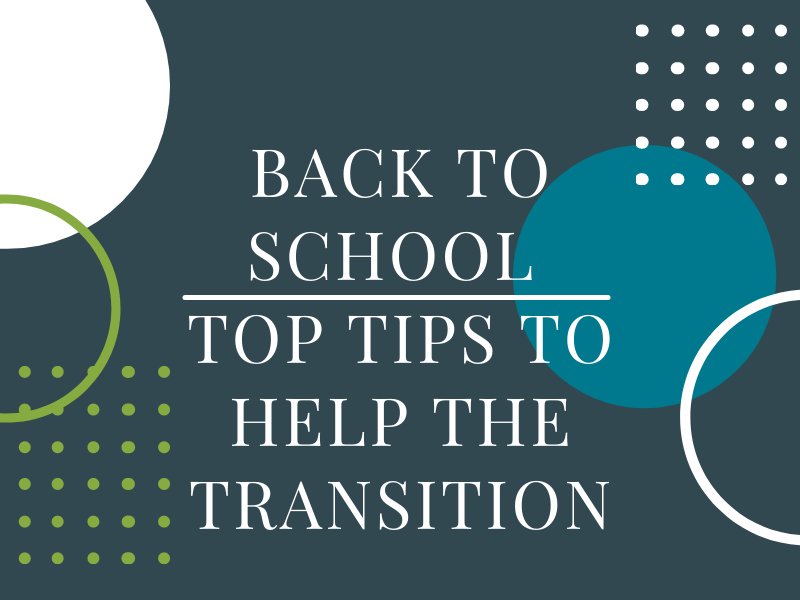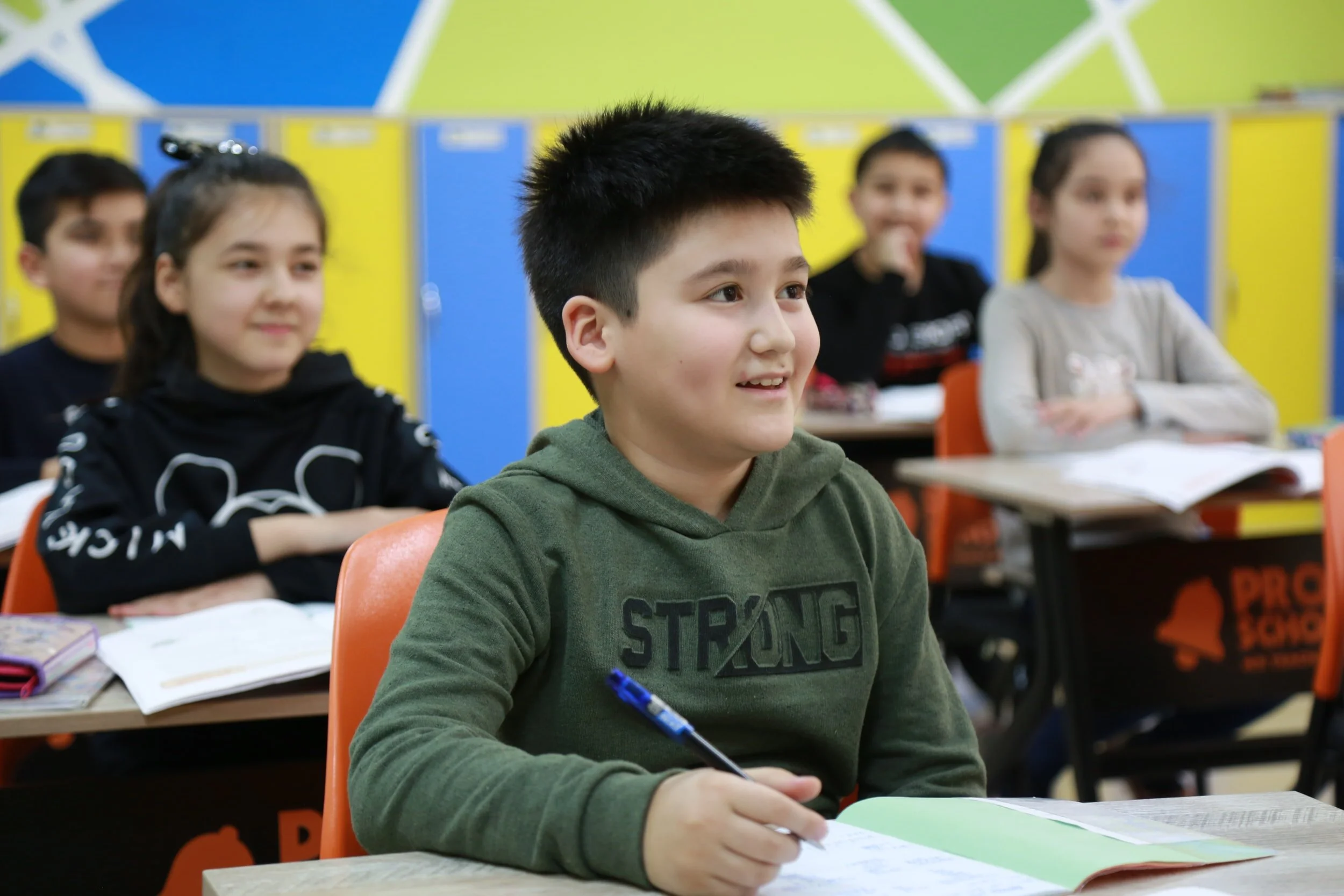Back to School | Top tips to help the transition
Starting school, whether it be primary school for the older child or secondary school for the pre-teen and teenagers, is one of the biggest milestones for both children and parents alike. Some will take it in their stride whereas for many it can take time to settle and adjust to a whole new way of life, forming friendships, getting to know their teacher, fitting into new school routines and embracing a whole new and exciting way of learning.
Although children can be resilient it’s important that they have that time and space to prepare while making the most of this widely anticipated transition of starting primary or secondary school - once they become familiar with the upcoming transition the more content and confident they will feel in their new environment.
Back to School Tips
In this blog I will share with you
How you can prepare the younger child for primary school
How to help your child build resilience
How you can prepare your preteens and teenagers for secondary school
Primary School - Preparing for the big day
Junior infants, the first year of school is about settling in, relating to others, making friends, feeling happy and adapting to the school routine while gently learning through play.
It’s a great help if children can put on, take off and hang up their coat, flush the toilet and wash hands, tidy up, share and contently stay out of the home environment for a few hours.
Prior to starting on the first day, chat to your child about the teacher, activities, friends and allow them to be part of buying their bag and getting organised.
Lead by example to help your child feel calm and reassured
The calmer and more relaxed you can be the more the child will notice this too.
Acknowledge your child’s feelings
Let them know that it’s ok to feel a little nervous, excited, and sometimes overwhelmed. This gives them the permission to feel all the emotions while having your support too.
Be confident in their ability to cope
As parents and caregivers, our natural instinct is to protect and give our children the tools to help them manage, however we must not underestimate their own resilience and ability to manage and cope in new environments. The more you can support the day-to-day routines, be consistent by giving your child the same message each day while creating opportunities to affirm their positive thoughts on school, the more they will feel like they can do it! Positive affirmation cards are a great way to help children manifest these positive thoughts and are available to purchase from the Cool Food School here
What to do if your child is upset during the first few days?
Firstly, it’s the most natural thing in the world, children find it hard to self-regulate so they rely on adults to keep them calm and assured, particularly when they are upset.
When they know there is a pending separation they fret and wonder how they are going to manage without their trusted adult.
These emotions are the basis of a positive secure attachment.
Top Tip: Avoid the long goodbyes
When a child is securely attached to their parent or caregiver they will subsequently attach to other trusting adults, like a teacher, principal, SNA’s, preschool teacher, childcare staff, childminders etc.
They then learn very quickly that those adults will comfort them and provide that consistency and care that we give them.
The longer we hang around to say goodbye often the harder it is for both the parent and child.
I know it may go against our natural instincts to say goodbye and leave but it’s the most ideal way to separate. The longer we stay the harder it will be for everyone. This may break hearts but it’s the most ideal for both the child and at times the parent!
If your child is really struggling, this can be from your smaller children to your older ones – but if you can, hold back the tears until they are out of sight.
Two enjoyable book titles for separation are:
The Kissing Hand by Audrey Penn
The Invisible String by Patrice Karst
Finally, trust the teacher, they are used to dealing with all kinds of scenarios, they know that it is best for the parent to leave, even if your child remains upset. A child’s resistance for a parent to go is very natural. Try to persevere from the beginning, children do settle quickly after you have left.
See lots more tips here including what the morning routine can look like, managing bedtimes and device use in my recent blog following our third lockdown
9 steps to help prepare the kids as they return to school
Children are natural learners, they have a great sense of curiosity and enthusiasm to know and find out more about themselves, about others and the world around them. Small children absorb all things new; this is encouraged even more when they are ready and interested. The first year of school is primarily about settling in, making friends, and feeling content in themselves; for now, being there for them during this big step is better than anything else.
Building Resilience
I recently spoke to Richard Hogan, Family Psychotherapist about resilience. One great tip he provided when I asked him what we as parents can do at home to help our children was “I think a crucial tip would be to remember how you taught your child to cross the road. You would never say to your child as you’re down at the crossing ‘don’t worry about the cars I will always be here to help you across the road.’ We wouldn’t do that because we know we will not always be there, and we want them to be able to deal with the crossing when we are not there. So, when a challenge comes into our child’s life, fight the immediate impulse to solve the problem, because when you do that you are removing your child’s ability to develop the skills to manage themselves. Think of that child at the crossing, they know the cars are transient and the road will be clear so they will be able to cross safely soon. Our children need to learn this about themselves too. They will face adversity, but it will pass, and they will be able to manage it. Ask yourself, who’s needs do I meet when I solve the problem for my child?”
You can read more here How to help children build resilience
How to prepare preteens and teenagers for secondary school
As for preteens and teenagers, I am writing about supporting our older children’s move from primary to secondary as not only to support these families but that this is a transition we will be personally going through with our son this September.
the main concerns for students when they transition from primary to secondary
In comparison to this time last year’s return to school during Covid, we know a lot more about what to expect for September 2021.
Friendships
“The Growing up in Ireland study conducted by the ESRI found that 1/5 young people were anxious about making friends.”
This can be one of the hardest factors for a young person and something they can feel quite anxious about - going from knowing everyone in primary school to making new friends in secondary school. If the majority of 6th class students spread out among various schools in their area or beyond, this is often the time when they feel vulnerable.
Going from being the eldest to the youngest
Pre-teens can feel vulnerable and overwhelmed. It’s a significant adjustment that we as parents need to be aware of.
Going from having one teacher to many
Depending on the different subjects, this varies between schools. Different teachers will have different personalities, they will also have different expectations.
Moving from being in a mixed school (boys and girls) to single sex or vice versa
This can be a huge transition more so than we as parents realise so it’s one part of this change that we need to be aware and understanding of.
Longer Days
Some classes last one hour, so for example they may have six one hour classes in the one day with relevant breaks, while other schools may have 45 minute classes. A lot of schools now have a half day – however their days are significantly longer, intense and require a lot of organisation on their part.
A need to be more independent
In primary school they start to become independent within the classroom however when they start secondary school, they need to be organised with their timetable, books and getting around different classrooms, this is part of the adapting that children need to become familiar with and it will take time with the adult’s support as well as school support too.
What can parents and caregivers do to support their child?
Keep communication open
If you do get the opportunity to chat about how they are feeling about starting school – what can be helpful is asking them ‘what would you like to get out of this first term?’ Remember to validate how they are feeling if anxious, excited, apprehensive (this allows them permission to express themselves and that it’s ok) It takes time for some students to settle in – for many it can take up to October, or Christmas.
Routine
Encourage early to bed in the early weeks, a bedtime between 7- 8pm for up to 6 year olds is ideal and older than that depends on the family and what their child needs, but ideally 10 hours of sleep will benefit each child. Students can be very tired as it’s a longer day, they can also feel overwhelmed, it’s a huge undertaking moving from primary to secondary – as for parents it’s about being patient, understanding and supportive.
Typically, the year head or tutor meets the student at some point in the day
They are the go-to person and for parents to keep in contact with if anything comes up at home, so the student is supported. Keep communication open if necessary.
Help your teenager keep track of what they are covering in their subjects
Checking in a couple of times a week, for example, tell me two things you have learned in business this week? This is a great way to reinforce learning at home.
Encourage homework on the day given
While still fresh, some days are heavy workdays until they get used to the pace. If your child can get into the habit of doing their homework on the day given, this can really help them keep on top of their workload.
Wind down screens
Remove the devices from 9pm at night and out of the bedroom – this naturally encourages better sleep – see my blog here on how you can support your children by keeping safe online and how to create boundaries around device use.
Learn more | NEW eLearning Course: Managing Family Screen Time and Device Use
New school route & independently travelling to school
Ideally if you know your child will be travelling by public transport or will be taking a bike or walking to school, it’s helpful to practice the route together prior to their first day, just so they know what to expect
What can the young person do to help themselves?
Tips for being organised
Colour code and laminate their timetable and stick it up inside their locker
So they know when each class is on, ideally if you are organised , colour code the subjects, for example, put all geography classes in green and maths in red etc
Colour code the books
Additional to this is to colour code the books so for example, if green is for geography, put a small green sticker on the binding side of their geography book.
Prepare themselves for their classes
Organise books, workbooks etc up until first break at their locker in the morning (as opposed to preparing for the entire day) . At break, prep up until lunch and prep from after lunch until the end of the day.
Big Durable Folders
To include subject textbook, workbook and copy. A lot of books now come with an E-book – that can be downloaded at home so bringing books to and from home can be avoided or if forgotten for homework.
No matter what age or stage your children are at, there will always be a first for everything and everyone. Starting primary or secondary school is an experience every child will go through so giving them the resources and support needed to help guide and navigate those first few weeks and months is a significant starting point. Best of luck this September as we embrace yet another new term.
If you are feeling overwhelmed or facing challenges with your children, I am here to help. I offer tailored 1 to 1 parent support sessions or corporate parenting talks. Get in touch with me today at aoife@parentsupport.ie, I offer eLearning Parenting Courses on Positive Parenting and Managing Screen Time & Device Use which will help support you in the challenges you may be facing.



